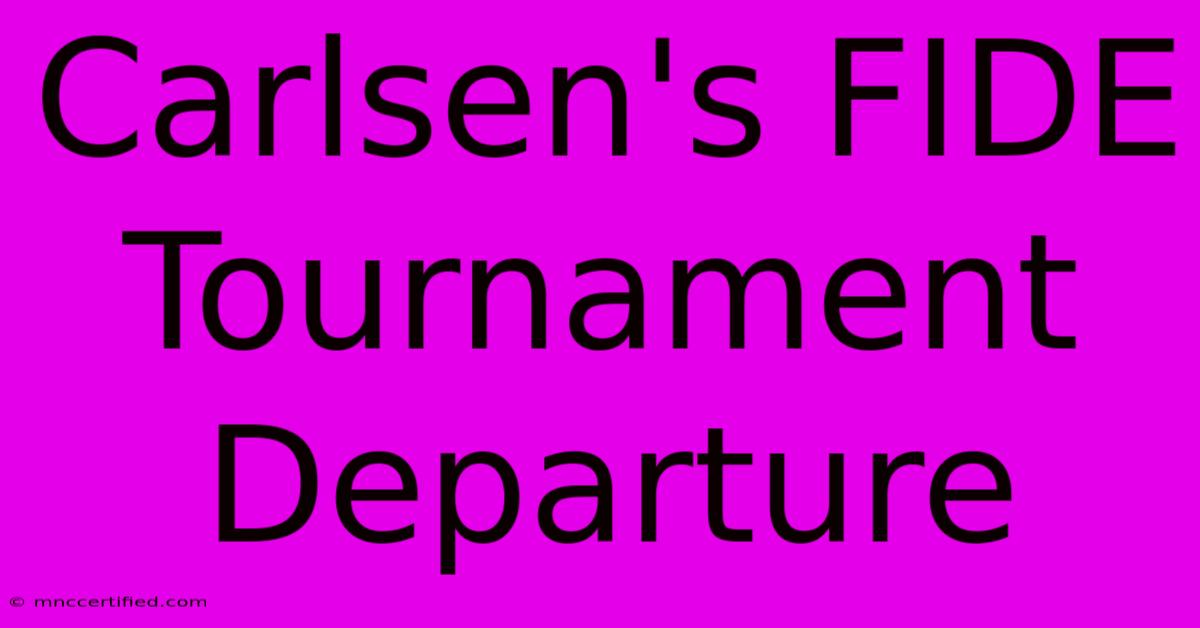Carlsen's FIDE Tournament Departure

Table of Contents
Carlsen's FIDE Tournament Departure: A Shocking Decision and its Implications
Magnus Carlsen, the five-time World Chess Champion, stunned the chess world with his unexpected announcement that he would not be defending his World Chess Championship title. This decision, though anticipated by some, sent shockwaves through the chess community, sparking intense debate and speculation about the future of the sport. This article delves into the reasons behind Carlsen's departure, its impact on the upcoming tournament, and its broader implications for the chess world.
The Shocking Revelation: Why Did Carlsen Withdraw?
Carlsen's decision, revealed subtly after his victory in the 2022 Sinquefield Cup, lacked a definitive explanation. While he hasn't explicitly stated his reasons, several factors likely contributed to his choice:
Lack of Motivation:
This is perhaps the most widely accepted theory. After years of dominating the chess world, maintaining the intense focus and dedication required to compete at the highest level might have become a burden. The sheer mental and physical toll of consistent high-level play is immense, and even the world champion is not immune to burnout. Carlsen himself hinted at a loss of motivation, suggesting the competitive fire had dimmed somewhat.
Strategic Considerations:
Some analysts suggest Carlsen's decision is a strategic one. By stepping down, he frees himself to focus on other aspects of chess, such as promoting the game through his various ventures, and potentially competing in other formats where he might find renewed enjoyment.
Ian Nepomniachtchi's Challenge:
Carlsen's previous challenger, Ian Nepomniachtchi, provided a tough match, hinting at a potential shift in the balance of power. While Carlsen won, the match highlighted the emergence of strong competitors, possibly influencing his decision to pursue other challenges.
The Impact on the World Chess Championship Cycle
Carlsen's withdrawal creates a significant void in the upcoming World Chess Championship cycle. The tournament will now proceed without the reigning champion, and a new champion will be crowned. This has several immediate consequences:
Increased Competition:
With Carlsen out of the picture, the competition for the title intensifies. Players who previously saw Carlsen as an insurmountable obstacle now have a clear path to the top. This could lead to a more unpredictable and exciting tournament.
Shifting Dynamics:
The absence of Carlsen fundamentally alters the dynamics of the tournament. The psychological aspect of facing the world champion is no longer a factor, leading to potentially different strategies and playing styles from the participants.
Uncertainty about the Future:
Carlsen's decision introduces a degree of uncertainty about the future of the World Chess Championship. His continued involvement in chess, albeit in different formats, is crucial for the sport's popularity and growth. His future actions will heavily influence the tournament's long-term trajectory.
Beyond the Title: The Broader Implications
Carlsen's departure transcends the immediate impact on the World Chess Championship. It raises important questions about the future of elite chess, professional sports careers, and the pressures faced by top athletes.
Burnout in Elite Sports:
Carlsen's decision highlights the issue of burnout in high-pressure environments. His experience serves as a reminder of the importance of mental well-being and sustainable career management in demanding professional fields.
The Future of Chess:
While Carlsen's absence is a blow, it also presents an opportunity for the sport to evolve and attract a new generation of players and fans. The increased competitiveness and unpredictable nature of future tournaments might prove beneficial in the long run.
Carlsen's Legacy:
Despite his departure from the title matches, Carlsen's legacy as one of the greatest chess players of all time remains secure. His impact on the game is undeniable, and his future contributions, regardless of his competitive status, will continue to shape the chess landscape.
In conclusion, Carlsen's decision marks a pivotal moment in the history of chess. While his absence from the World Chess Championship is significant, it also presents both challenges and opportunities for the sport. The future remains uncertain, but one thing is clear: the chess world will be watching closely to see how this dramatic shift plays out.

Thank you for visiting our website wich cover about Carlsen's FIDE Tournament Departure. We hope the information provided has been useful to you. Feel free to contact us if you have any questions or need further assistance. See you next time and dont miss to bookmark.
Featured Posts
-
Bengals Vs Broncos Live Stream
Dec 29, 2024
-
Fight Leads To Nurkic Marshall Suspensions
Dec 29, 2024
-
Diamondbacks Sign Corbin Burnes
Dec 29, 2024
-
Watch Patriots Vs Chargers Nfl Game Time
Dec 29, 2024
-
Broncos Vs Bengals On Tv Today
Dec 29, 2024